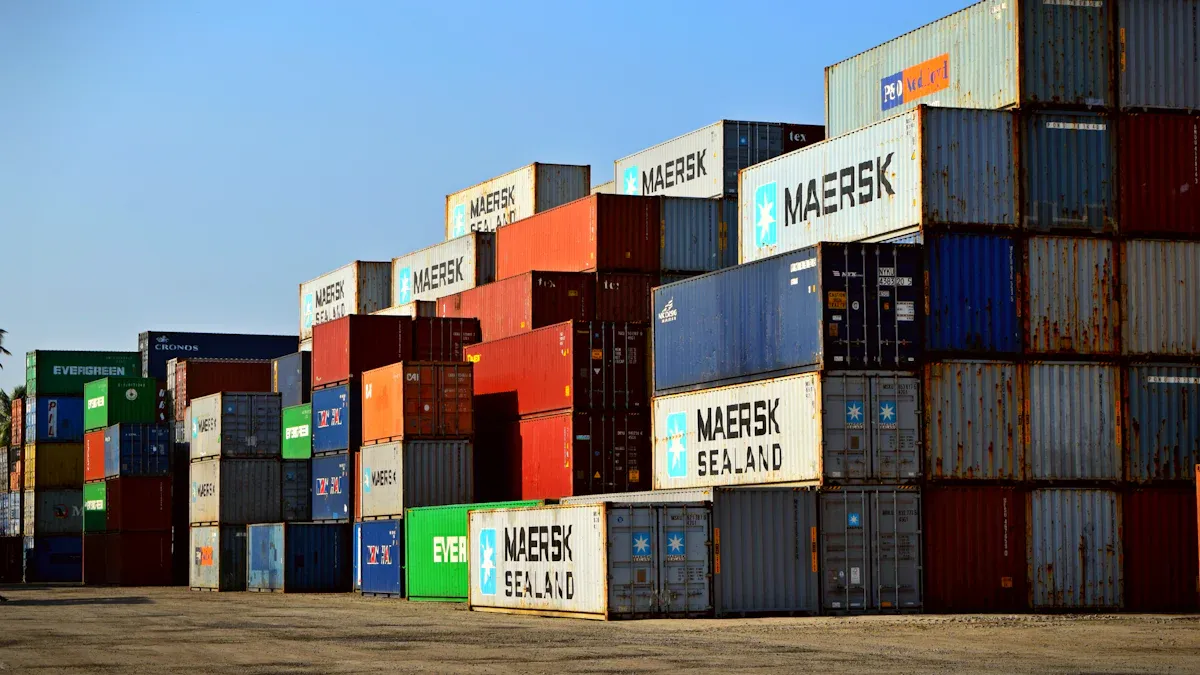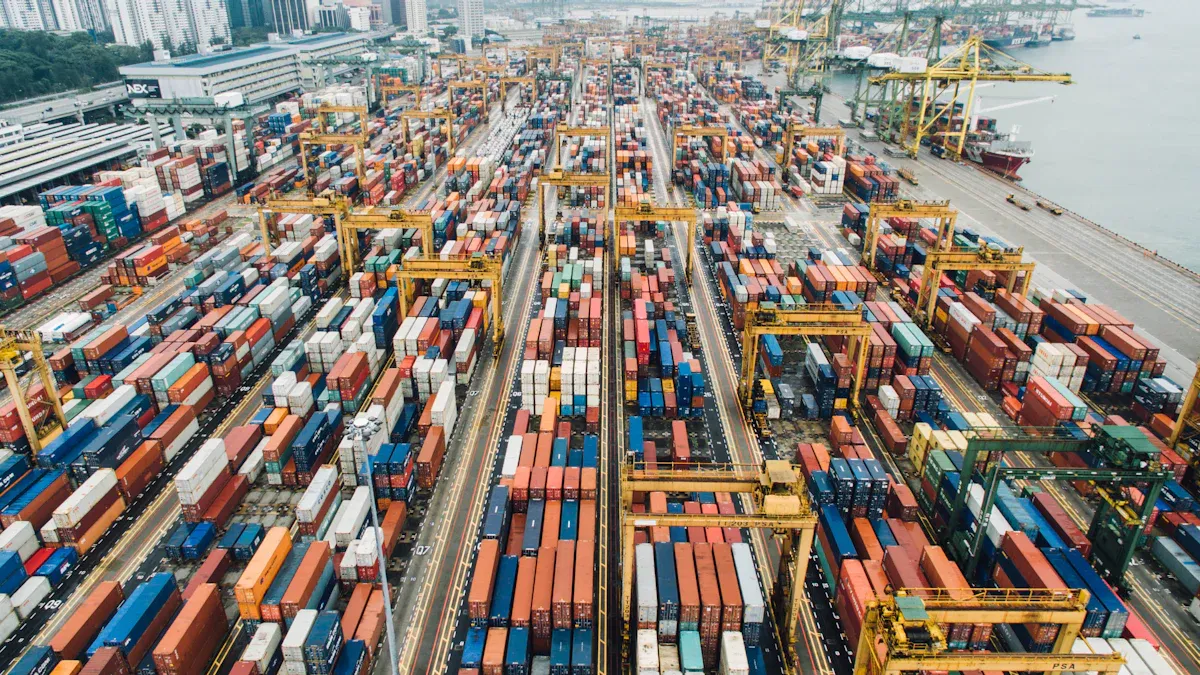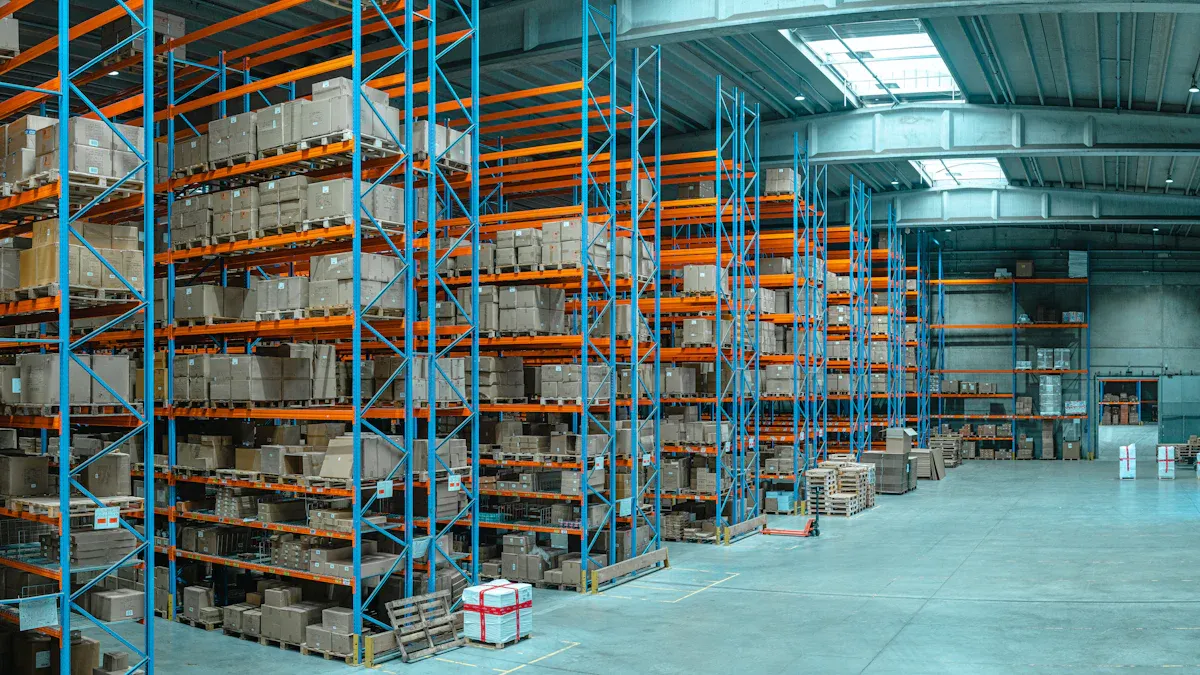Why Logistics Drives Success in Global Commerce

You depend on logistics every time you order a product from another country or see fresh fruit in your local store. Over 80% of global trade moves by sea, showing how logistics powers the world’s markets. Studies show that strong logistics systems, like better roads and faster customs, help countries grow their economies and reduce income gaps. When you recognize the value of global commerce logistics appreciation, you understand how logistics connects people, businesses, and communities everywhere.
Key Takeaways
Logistics connects producers and consumers, ensuring fast and safe delivery of goods across borders.
Strong logistics systems drive economic growth by attracting investment and improving productivity.
Efficient logistics can save businesses 10% to 20% annually, allowing for growth and innovation.
Real-time tracking and automation enhance customer satisfaction by ensuring timely deliveries.
Adapting logistics strategies helps businesses navigate disruptions and stay competitive in a changing market.
Logistics Connects Global Markets

Bridging Producers and Consumers
You see the impact of logistics every time you buy a product made in another country. Logistics creates a bridge between producers and consumers, making sure goods travel safely and quickly across borders. Companies like Amazon and UPS use smart logistics strategies to deliver products to your doorstep, no matter where you live. Amazon coordinates transportation and warehousing to ensure fast delivery. UPS adapted its logistics to ship medical supplies during the pandemic, showing how flexible logistics can support urgent needs.
Here is a table showing how different companies use logistics to connect producers and consumers:
Company | Example of Logistics Strategy | Impact on Global Commerce |
|---|---|---|
UPS | Adapted to healthcare logistics during pandemic | Supported medical goods shipping, showing flexibility |
Amazon | Efficient transportation and warehousing | Ensured quick, reliable delivery, improving satisfaction |
Starbucks | Strong supplier relationships | Improved product quality and community well-being |
Zappos | Customer-focused supply chain | Built loyal customers through great shopping experiences |
Walmart | Cost-efficient supply chain | Kept prices low and stayed profitable |
You benefit from these strategies when you receive products faster and at lower costs. Logistics partners and networks also play a big role. They connect shippers with carriers and manage the details of moving goods. Good communication between logistics providers and manufacturers helps avoid delays and keeps inventory levels steady.
Facilitating International Trade
Logistics makes international trade possible by moving goods between countries. You rely on strong transportation infrastructure, like roads, ports, and airports, for fast and cost-effective shipping. Canada’s logistics system, for example, supports trade with the US and ranks high in global performance. Customs procedures and compliance are important, too. Knowing the rules for tariffs and documents helps shipments move smoothly. Customs brokers guide shipments through regulations, speeding up clearance and reducing costs.
Here is a table that explains key parts of international logistics:
Customs Procedures and Compliance | Description |
|---|---|
Importance of Customs Rules | Each country has its own rules for tariffs and documents. Missing details causes delays. |
Role of Customs Brokers | Brokers help shipments clear customs faster and lower costs. |
Documentation Requirements | Accurate paperwork prevents delays and extra fees. |
Trade regulations and agreements also help. Trade blocs like the EU and NAFTA harmonize rules among member countries, making it easier to move goods. You see the results when products from different countries arrive in stores quickly and at fair prices. Logistics also uses digital technologies to track shipments and improve efficiency. Trade facilitation measures, like better customs procedures, lower costs and make international transactions smoother.
Driving Economic Growth
You help drive economic growth when you support efficient logistics. Countries with strong logistics systems attract more investment and create better jobs. In Cambodia, improvements in logistics performance have a direct link to higher GDP. Good infrastructure, like roads and ports, brings in foreign investment and helps businesses grow. When logistics works well, companies lower their costs and improve productivity.
Here is a table showing how logistics impacts economic growth:
Impact Area | Description |
|---|---|
Productivity | Better logistics reduce costs and improve business efficiency. |
Investment Attraction | Strong infrastructure brings in domestic and foreign investments. |
Quality of Life | Improved infrastructure leads to better living standards. |
You see these benefits in developing economies, where logistics helps reduce poverty and boost growth. Global commerce logistics appreciation means recognizing how logistics supports communities and helps countries compete in world markets. When you value logistics, you understand its role in connecting people, improving lives, and building strong economies.
Global Commerce Logistics Appreciation
Why Logistics Deserves Appreciation
You see logistics at work every time you order a product online or watch goods move across borders. Logistics makes every international transaction possible. You depend on logistics for fast and trackable delivery, especially in cross-border e-commerce. When you think about global commerce logistics appreciation, you recognize how logistics keeps the world connected and businesses running smoothly.
Here are some reasons why logistics deserves more appreciation:
Logistics supports every e-commerce activity and international trade.
Countries with strong logistics systems attract more foreign investment and become more competitive.
Rapid delivery and shipment tracking rely on advanced logistics.
Disruptions in logistics can slow down global trade and affect daily life.
Sustainable logistics helps protect the environment and supports responsible commerce.
You notice the importance of logistics when supply chains face challenges. If logistics fails, products do not arrive on time, and businesses lose money. When you value global commerce logistics appreciation, you understand how logistics shapes your shopping experience and supports the global economy.
Logistics as the Supply Chain Backbone
You rely on logistics professionals to keep supply chains strong and efficient. These experts manage the flow of goods, making sure products reach you quickly and safely. They follow regulations and adapt to market changes, helping companies stay flexible.
Logistics professionals help supply chains succeed in many ways:
They improve operational efficiency and responsiveness in global markets.
They make sure shipments follow all rules and regulations.
Their skills in logistics strategies and supplier relationships help companies meet customer needs.
They use technology like AI to reduce delays and control costs.
They create tailored strategies that consider transportation, local rules, and trade agreements.
Modern supply chains use huge amounts of data. You benefit from advanced analytics platforms that show clear dashboards and predict demand. Data analytics helps companies manage inventory and optimize delivery routes. When data is accurate, complete, timely, consistent, and synchronized, trading partners communicate better and avoid mistakes.
Tip: High-quality data helps supply chains work smoothly. You get your products faster and businesses save money.
Impact on Developing Economies
You see the power of logistics in developing economies. Improved logistics helps countries trade more easily and grow their economies. When logistics systems get better, poverty rates can go down.
Here is a table showing how logistics improvement helps developing economies:
Aspect | Description |
|---|---|
Role of Logistics | |
Economic Growth Driver | International trade is a powerful driver of economic growth and poverty reduction in developing economies. |
You support global commerce logistics appreciation when you recognize how logistics helps communities thrive. Better roads, ports, and customs systems make it easier for businesses to export goods and create jobs. When logistics works well, people in developing countries have more opportunities and a better quality of life.
Logistics Efficiency & Cost Reduction

Streamlining Supply Chains
You can make your supply chain work better by using smart logistics strategies. Automation tools help you manage inventory and keep track of goods. Good data management lets you spot problems early and fix them fast. Real-time visibility across your supply chain means you always know where your products are. When you review and improve your logistics plans often, you find new ways to save time and money.
Here are some top ways to streamline your supply chain:
Use automation to boost accuracy and speed.
Manage your data well to avoid mistakes.
Track your goods in real time for quick problem-solving.
Keep improving your logistics strategies to stay ahead.
Lowering Operational Costs
You can lower your business costs by making your logistics more efficient. Many companies save between 10% and 20% each year by optimizing their logistics, while still keeping customers happy.
Potential Savings | Description |
|---|---|
10% - 20% | Annual savings achievable through logistics optimization while maintaining service quality. |
You can also save money by managing tariffs and trade rules well. If you use more than one region for your supply chain, you avoid big risks and keep costs steady. Lower logistics costs mean you have more money to grow your business and try new ideas.
Manage tariffs and trade rules to avoid paying too much.
Use different supply regions to keep costs stable.
Free up money for growth by cutting logistics costs.
Optimizing Resources
You can use new technology to get the most out of your resources. Tools like AI, IoT, and blockchain help you predict demand and manage inventory better. Automation cuts down on mistakes and speeds up your work. Using electric vehicles and planning better routes saves fuel and helps the environment.
AI helps you forecast demand and keep the right amount of stock.
Automation makes your operations faster and more accurate.
Sustainable practices, like electric vehicles, lower your carbon footprint.
You measure your logistics success by looking at inventory, working capital, delivery times, and customer service. Good communication and strong technology help you reach your goals. When you focus on global commerce logistics appreciation, you see how these efforts make your business stronger and more efficient.
Customer Satisfaction & Competitiveness
Fast & Reliable Delivery
You expect your orders to arrive quickly and on time. Fast and reliable delivery shapes your experience as a customer. When companies deliver products without delays, you feel satisfied and trust the brand. Businesses that use advanced logistics and technology can track shipments in real time and improve delivery accuracy. This helps them meet your expectations and stand out in the market.
Fast shipping is crucial for customer satisfaction and competitiveness in eCommerce.
Reliable delivery reduces disruptions and builds trust.
Consistent delivery leads to repeat orders and positive word-of-mouth.
Optimized delivery systems improve satisfaction, profitability, and market share.
Note: Companies that use integrated order processing systems can boost productivity by 25% and cut shipping mistakes by 67%. You benefit from fewer errors and faster service.
Custom Solutions for Global Markets
You live in a world where every market is different. Companies need custom logistics solutions to compete globally. These solutions help businesses manage their supply chains better by increasing transparency and improving inventory management. When companies track items in real time, they can meet your needs more accurately.
Increased transparency lets you see where your order is at any time.
Efficient inventory management means you get the products you want, when you want them.
Better supplier management reduces delays and improves communication.
Custom logistics also help companies reduce bottlenecks and build stronger relationships with suppliers. This means you get better service and more choices, no matter where you live.
Building Brand Reputation
You trust brands that deliver on their promises. Reliable logistics play a big role in building and keeping that trust. When your orders arrive on time and in good condition, you feel confident in the brand. One late or damaged shipment can hurt a company’s reputation, but dependable delivery encourages you to buy again.
Companies that use eco-friendly logistics attract customers who care about sustainability.
Brands that align with your values, like protecting the environment, earn your loyalty.
Sustainable practices also help companies form strong partnerships with others who share their goals.
Tip: Brands that set clear sustainability goals and report their progress build even more trust with you. Investing in new technology helps them deliver faster and protect the planet at the same time.
Risk Management & Adaptability
Handling Supply Chain Disruptions
You face many risks in global logistics. Disruptions can happen at any time and slow down your supply chain. Some of the most common problems include:
Natural disasters
Geopolitical risks
Raw material shortages
Logistics bottlenecks
Cybersecurity threats
You can reduce the impact of these disruptions by using smart logistics strategies. Real-time visibility lets you track shipments and spot problems early. Effective communication keeps everyone informed and ready to act. You can also work with backup suppliers to avoid shortages. Many companies use digital tools like AI and machine learning to predict risks and respond quickly.
Tip: When you use technology and keep good communication, you make your supply chain stronger and more flexible.
Navigating Regulations
You must follow many rules when moving goods across borders. Each country has its own customs regulations, trade agreements, and import or export restrictions. If you do not follow these rules, you may face delays or extra costs. Logistics providers help you stay compliant by using technology and building strong partnerships.
Aspect | Description |
|---|---|
Regulatory Compliance | You need to know customs rules, trade agreements, and restrictions to avoid delays and penalties. |
Technology Integration | Top logistics companies use tracking and documentation tools to automate checks and provide updates. |
Strategic Partnerships | Working with local experts helps you handle local customs and regulations smoothly. |
You also need to follow vehicle and driver safety rules for road transport. Many logistics companies train their couriers to handle sensitive shipments and meet all security standards.
Adapting to Market Changes
You live in a fast-changing world. Markets shift quickly, and you must adapt to stay ahead. Logistics companies use several strategies to keep up with these changes:
Strategy | Description |
|---|---|
Leveraging Technology | Use CRM systems, automation, and analytics to improve communication and customer support. |
Implementing E-Commerce Platforms | Build strong online sales channels to reach more customers and streamline transactions. |
Diversification Of Services | Offer new services to meet different needs and reduce risks. |
Agility and Flexibility | Create flexible pricing and sales models to respond quickly to market shifts. |
You see these strategies in action when companies deliver products faster, offer new services, and adjust prices to match demand. By staying agile, you can handle challenges like rising fuel costs, labor shortages, and the need for sustainable practices.
You depend on logistics every day. Logistics acts as the circulatory system of global commerce, moving goods, managing inventory, and using technology to keep everything running smoothly. You see lower costs, faster deliveries, and better service because of strong logistics. Companies use automation, real-time tracking, and sustainable practices to stay competitive and protect the planet.
As global trade evolves, you will see more digital tools, smarter delivery, and greener solutions. When you value logistics, you gain a powerful advantage in a changing world.
FAQ
What is logistics in global commerce?
Logistics means moving goods, services, and information from one place to another. You use logistics to get products from factories to stores or your home. Good logistics helps businesses trade with other countries.
How does logistics help you get products faster?
You get products faster because logistics companies use smart planning, technology, and tracking. They choose the best routes and manage warehouses well. This reduces delays and keeps your orders on time.
Why do companies invest in better logistics?
Companies invest in better logistics to save money, improve delivery speed, and keep customers happy. You benefit from lower prices and reliable service. Good logistics also helps companies compete in global markets.
What happens if logistics fails?
If logistics fails, you may face late deliveries, empty store shelves, or higher prices. Businesses lose money and trust. Strong logistics keeps everything running smoothly for you and the economy.
See Also
Key Strategies for Effective Global Logistics Operations
The Role of Direct Logistics in Enhancing Global Efficiency
Transforming International Operations with Creative Logistics Solutions
Streamlining Supply Chains in the USA with Global Logistics
PGL's Proficiency in Global Logistics and Supply Chain Solutions
